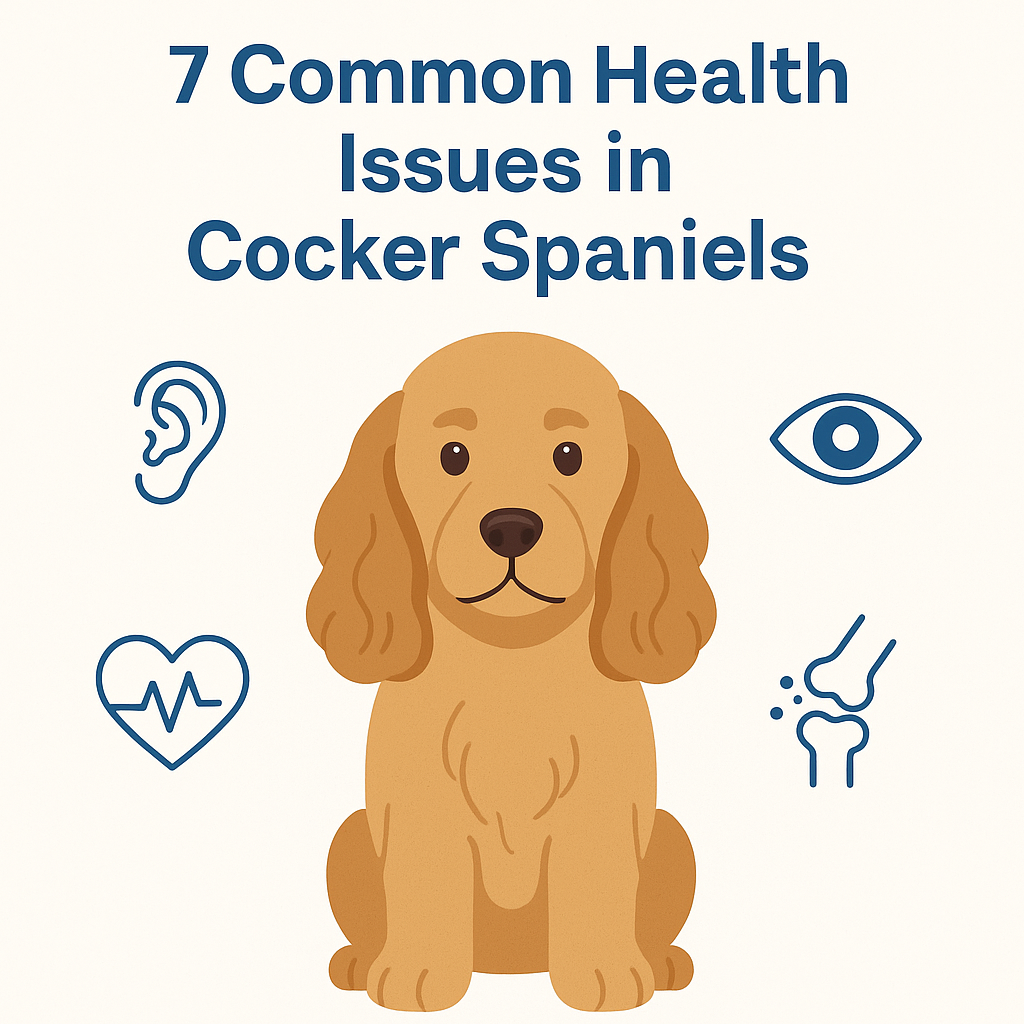
🐾 7 Common Health Issues in Cocker Spaniels – Prevention and Care Guide
7 Common Health Issues in Cocker Spaniels – Prevention and Care Guide
Behind the Cute Face Lies a Need for Careful Health Management
The Cocker Spaniel is a beloved breed known for its affectionate nature, silky coat, and long, floppy ears.
However, due to their dense fur, long ears, and genetic traits, Cocker Spaniels are prone to a variety of health issues.
In this post, we’ll explore the 7 most common health issues in Cocker Spaniels, along with expert prevention and care tips.
⚠️ 7 Common Health Issues in Cocker Spaniels
1. Chronic Ear Infections (Otitis Externa)
Their long, covered ears trap moisture and heat, creating the perfect environment for bacterial and yeast growth.
-
Symptoms: foul odor, head shaking, discharge
-
Prevention: weekly cleaning, keep ears dry and trimmed
-
Care: medicated ear drops, drying agents, anti-inflammatory treatments
2. Cataracts and Glaucoma
Cocker Spaniels are genetically predisposed to eye diseases that can lead to blindness if left untreated.
-
Symptoms: cloudy eyes, eye redness, bumping into things
-
Prevention: eye supplements, annual eye exams
-
Care: intraocular pressure medication, surgery if necessary
3. Skin Allergies and Dermatitis
Their thick, wavy coat often traps allergens and moisture, making them vulnerable to fungal infections and allergic dermatitis.
-
Prevention: hypoallergenic diet, moisturizing shampoos
-
Care: topical steroids, antihistamines, medicated creams
4. Mitral Valve Disease (Heart Valve Disorder)
As they age, Cocker Spaniels may develop degeneration of the heart valves, leading to heart murmurs and blood backflow.
-
Symptoms: chronic cough, fatigue, labored breathing
-
Prevention: low-sodium diet, early monitoring
-
Care: prescription heart medication, regular echocardiograms
5. Hip Dysplasia
Their compact frame can lead to misaligned hip joints, especially in senior dogs or overweight individuals.
-
Symptoms: limping, difficulty standing
-
Prevention: genetic screening, proper weight management
-
Care: joint supplements, physical therapy, surgery if advanced
6. Epilepsy
Cocker Spaniels are genetically prone to seizures, which often begin in early adulthood.
-
Symptoms: tremors, drooling, loss of consciousness
-
Care: daily anticonvulsants, low-stress routine
7. Hypothyroidism
An underactive thyroid can lead to weight gain, lethargy, and coat thinning.
-
Diagnosis: blood tests
-
Care: lifelong thyroid hormone therapy
🛡️ Health Tips for Cocker Spaniels
-
Clean and dry ears regularly, especially after swimming
-
Monitor eyes for cloudiness or redness
-
Use limited-ingredient diets to manage allergies
-
Provide orthopedic beds and avoid over-exercising puppies
-
Schedule regular cardiac, dermatologic, and ophthalmologic checkups
🛒 Recommended Products for Cocker Spaniels
-
Ear cleaning kits and antifungal drops
-
Eye health supplements (lutein, astaxanthin)
-
Hypoallergenic food and moisturizing shampoo
-
Heart-support treats and low-sodium diets
👉 Shop Cocker Spaniels Health Products
External Resource (DoFollow)
Reference: AKC – Cocker Spaniel Health
Internal Resource
👉 Related article: Common Health Issues in Chihuahuas – Prevention Guide
🧩 Frequently Asked Questions (FAQ)
Q1. How often should I clean my Cocker Spaniel’s ears?
A1. At least once or twice a week, and always after swimming or baths.
Q2. My dog’s eyes look cloudy. What should I do?
A2. Cloudiness or redness may indicate cataracts or glaucoma. Early vet consultation is essential.
Q3. Can mitral valve disease be cured?
A3. While it can’t be cured, medication and regular vet monitoring can greatly extend your dog’s quality of life.

